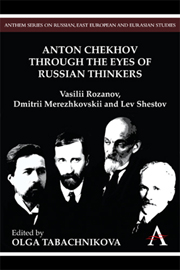 Anton Chekhov Through the Eyes of Russian Thinkers
Anton Chekhov Through the Eyes of Russian Thinkers from Part Three - Lev Shestov
Published online by Cambridge University Press: 05 March 2012
Shestov's work on Chekhov – his substantial article ‘Creation from Nothing’ (Tvorchestvo iz nichego, 1905) – has not been forgotten in modern Chekhov studies, but is referred to only rarely, and even then in negative terms. The following famous lines are most commonly quoted: ‘Persistently, dolefully, monotonously, during his almost 25-year literary career, Chekhov was engaged in one single activity: the various ways to kill human hope’. As a rule, researchers point out that what one should discuss here is illusion rather than hope. I contend that there is more to this matter than appears from this single quotation. Shestov himself felt that the quotation did not necessarily carry a negative meaning. Moreover, it did not prevent Shestov from considering Chekhov as practically the only writer among his contemporaries who spoke the truth, not because he was forced by the ‘idea’, but out of his own free will. The title of Shestov's article on Chekhov is directly related to the principal statement from The Apotheosis of Groundlessness (Apofeoz bespochvennosti): ‘all creation is creation out of nothing’.
In the current chapter, I examine Shestov's paradoxical interpretation of Chekhov's creativity, by comparing aspects of Shestov's philosophy to Chekhov's artistic world.
In my view, Shestov's philosophy can be characterized as irrational. In both his early and later works, his opposition of speculation to revelation is central.
To save this book to your Kindle, first ensure no-reply@cambridge.org is added to your Approved Personal Document E-mail List under your Personal Document Settings on the Manage Your Content and Devices page of your Amazon account. Then enter the ‘name’ part of your Kindle email address below. Find out more about saving to your Kindle.
Note you can select to save to either the @free.kindle.com or @kindle.com variations. ‘@free.kindle.com’ emails are free but can only be saved to your device when it is connected to wi-fi. ‘@kindle.com’ emails can be delivered even when you are not connected to wi-fi, but note that service fees apply.
Find out more about the Kindle Personal Document Service.
To save content items to your account, please confirm that you agree to abide by our usage policies. If this is the first time you use this feature, you will be asked to authorise Cambridge Core to connect with your account. Find out more about saving content to Dropbox.
To save content items to your account, please confirm that you agree to abide by our usage policies. If this is the first time you use this feature, you will be asked to authorise Cambridge Core to connect with your account. Find out more about saving content to Google Drive.